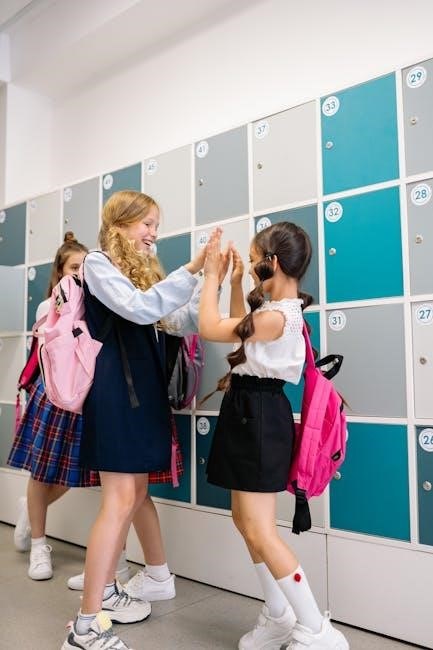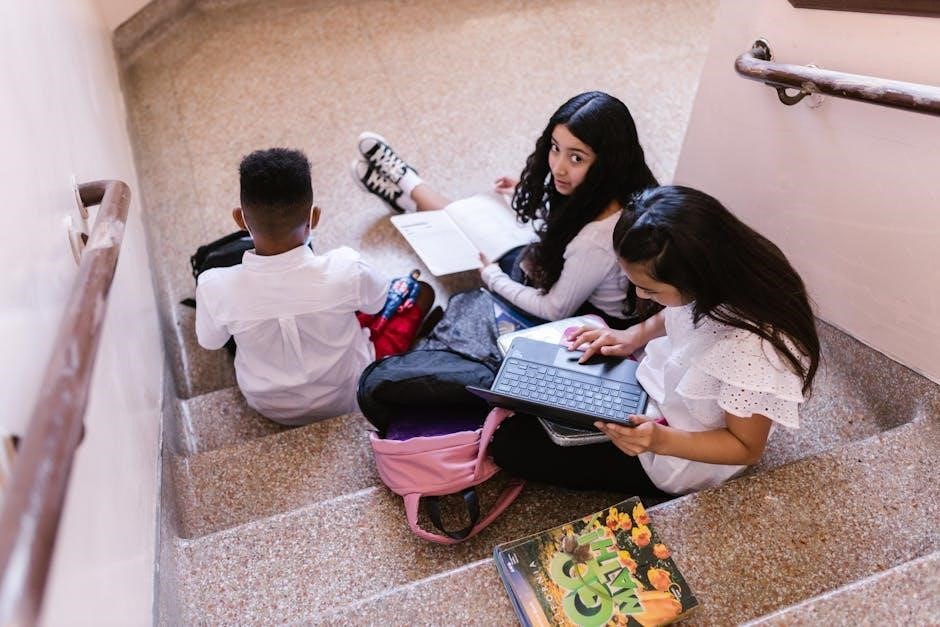The 7 Habits for Highly Effective Teens, by Sean Covey, offers a transformative guide for teenagers to navigate life’s challenges with confidence and resilience, fostering self-esteem and personal growth.
Overview of the Book and Its Importance
Sean Covey’s The 7 Habits of Highly Effective Teens is a practical guide tailored for adolescents, offering timeless principles to navigate life’s challenges. The book emphasizes self-awareness, responsibility, and interpersonal skills, empowering teens to build confidence and resilience. Its relatable examples and real-life scenarios make it a vital resource for personal growth. Widely acclaimed, it has helped millions of teenagers worldwide, making it a cornerstone for fostering positive change during critical formative years.
How the 7 Habits Can Transform a Teen’s Life
The 7 Habits empower teens to take control of their lives, fostering self-esteem, responsibility, and confidence. By applying these principles, teenagers can improve relationships, make better decisions, and develop a growth mindset. The habits guide them in navigating challenges, setting goals, and understanding their potential. This transformative approach helps teens build resilience, embrace diversity, and cultivate lifelong skills for personal and academic success, leading to a more purposeful and fulfilling life.

Habit 1: Be Proactive
Being proactive means taking responsibility for your choices and actions, focusing on what you can control rather than reacting to circumstances passively.
Understanding Proactivity and Personal Responsibility
Proactivity is about taking initiative and owning your choices, focusing on what you can control rather than reacting to circumstances. Personal responsibility involves acknowledging your actions’ impact and being accountable for them. This habit encourages teens to stop blaming external factors and instead embrace their role in shaping their lives, fostering a mindset of empowerment and self-leadership to handle life’s challenges effectively.

Practical Steps to Develop a Proactive Mindset
Start by identifying areas within your control and focus on influencing positive outcomes. Set personal goals and take small, consistent actions toward them. Practice self-awareness by recognizing triggers that lead to reactive behavior. Replace excuses with solutions and cultivate a growth mindset. Use affirmations or journaling to reinforce proactive thinking. By taking ownership of choices and actions, teens can build confidence and develop a problem-solving approach to life’s challenges.

Habit 2: Begin with the End in Mind
Habit 2 encourages teens to set long-term goals and envision their future, providing clarity and direction for decisions aligned with personal values and aspirations.
Setting Long-Term Goals and Vision
Habit 2 emphasizes the importance of setting long-term goals and creating a clear vision for the future. By defining personal mission statements, teens can align their decisions with core values, fostering purposeful living. This habit encourages them to envision their ideal future, break it into manageable steps, and stay focused on what truly matters, helping them build a roadmap for success and personal fulfillment.
Creating a Personal Mission Statement
Creating a personal mission statement is a powerful step in Habit 2, helping teens define their purpose and values. It involves identifying core values, long-term goals, and what matters most. This statement becomes a guiding force, providing clarity and direction for decisions and actions. By crafting a mission statement, teens can stay true to their beliefs, focus on meaningful priorities, and align their lives with their vision for the future.
Habit 3: Put First Things First
Habit 3 focuses on effective time management and prioritizing tasks. It teaches teens to organize their lives by focusing on what truly matters, using the Time Management Matrix to distinguish between urgent and important activities, ensuring productivity and balance.

Time Management and Prioritization
Habit 3 emphasizes the importance of effective time management and prioritization. Teens learn to organize tasks using the Time Management Matrix, which categorizes activities into four quadrants: urgent and important, important but not urgent, urgent but not important, and neither. This tool helps teens focus on what truly matters, ensuring they allocate time wisely for school, responsibilities, and personal growth, leading to greater productivity and a balanced life.
Using the Time Management Matrix
The Time Management Matrix is a powerful tool introduced in Habit 3, helping teens prioritize tasks effectively. It divides activities into four quadrants: urgent and important, important but not urgent, urgent but not important, and neither. By focusing on what truly matters, teens can reduce stress, avoid procrastination, and allocate their time more efficiently, leading to greater productivity and a more balanced life.

Habit 4: Think Win-Win
Habit 4 encourages teens to build positive relationships by seeking mutual benefit in all interactions. This habit fosters collaboration, trust, and respect, leading to stronger connections and a supportive environment.
Building Positive Relationships
Habit 4 focuses on fostering mutual benefit, encouraging teens to build trust, respect, and empathy in their interactions. By prioritizing win-win outcomes, teenagers learn to value others’ needs and perspectives, creating stronger, more supportive relationships. This approach helps teens navigate social challenges, resolve conflicts, and cultivate a collaborative mindset, leading to lasting connections and a more harmonious environment.
Understanding the Value of Mutual Benefit
Habit 4 emphasizes the importance of mutual benefit in relationships, teaching teens to seek win-win solutions. By valuing others’ needs and perspectives, they build trust, respect, and empathy. This approach fosters stronger connections and resolves conflicts effectively. Understanding mutual benefit helps teens create supportive relationships that thrive on cooperation, ultimately benefiting both individuals and the community.

Habit 5: Seek First to Understand, Then to Be Understood
Habit 5 focuses on active listening and empathy to deeply understand others, fostering effective communication and stronger relationships, crucial for personal and social development.
The Power of Empathy and Active Listening
Empathy and active listening are essential for building strong, meaningful relationships. By truly understanding others’ perspectives, teens can communicate more effectively, resolve conflicts, and foster trust. Active listening involves fully engaging with others, while empathy allows teens to connect on a deeper level. These skills help navigate social challenges, promote mutual understanding, and create a supportive environment for personal and social growth, enriching both individual and collective experiences.
Improving Communication Skills
Effective communication is key to building strong relationships and achieving personal goals. By practicing active listening and expressing thoughts clearly, teens can convey their ideas with confidence and respect. This fosters mutual understanding, reduces misunderstandings, and strengthens connections. Empathy plays a crucial role in communication, allowing teens to respond thoughtfully and create meaningful interactions. Mastering these skills helps teens navigate social situations effectively and build positive, lasting relationships in all areas of life.
Habit 6: Synergize
Synergizing involves combining strengths to achieve better outcomes, fostering collaboration and valuing diversity. It encourages teens to work together, creating solutions greater than individual efforts alone, building unity and success.
Combining Strengths for Better Outcomes
Synergizing is about teamwork and collaboration, where diverse strengths and perspectives come together to create outcomes greater than individual efforts. By valuing differences and working collectively, teens can achieve more than they could alone, fostering unity and shared success. This habit encourages open communication and mutual respect, helping teens recognize that collaboration often leads to innovative solutions and stronger relationships.
Learning to Value Diversity and Collaboration
Valuing diversity and collaboration is a cornerstone of synergy, teaching teens to embrace differences and recognize the unique strengths others bring. By fostering an environment of respect and inclusivity, they learn that collaboration leads to richer ideas and solutions. This habit encourages teens to appreciate diverse perspectives, breaking down barriers and building stronger, more supportive relationships in all areas of life.

Habit 7: Sharpen the Saw
Habit 7 focuses on renewing physical, emotional, and spiritual health through self-care, ensuring long-term success and personal growth for teens.
Renewing Physical, Emotional, and Spiritual Health
Habit 7 focuses on self-care and renewal in four key areas: physical, emotional, mental, and spiritual. Teens are encouraged to prioritize activities that energize and balance these aspects of life. Regular renewal helps manage stress, build resilience, and maintain the energy needed to live effectively. By nurturing their whole being, teens can sustain long-term growth and successfully apply the other six habits in their daily lives.
Practicing Self-Care for Long-Term Success
Self-care is vital for long-term success, as it helps teens recharge and maintain balance. Habit 7 emphasizes activities that renew physical, emotional, and spiritual health. By prioritizing exercise, mindfulness, and meaningful connections, teens can prevent burnout and foster resilience. Regular self-care practices create a strong foundation for sustained growth, enabling them to consistently apply the 7 habits and achieve their full potential in life.
The Impact of the 7 Habits on Teenagers

The 7 Habits empower teens to navigate challenges with confidence, fostering self-esteem, better relationships, and a growth mindset. They equip teenagers with tools for long-term success and fulfillment;
Real-Life Success Stories and Testimonials
Millions of teens have benefited from Sean Covey’s The 7 Habits of Highly Effective Teens, transforming their lives by fostering self-esteem and resilience. Real stories highlight how these habits improved relationships, academic performance, and personal growth. Teens and parents alike testify to the book’s impact, calling it a game-changer for navigating adolescence and building a strong foundation for future success. These testimonials underscore the lasting, positive influence of the 7 habits on young lives.
How Teens Can Apply the Habits in Daily Life
Teens can apply the 7 Habits by incorporating them into daily routines, such as taking responsibility for choices, setting clear goals, and prioritizing tasks. By practicing proactive behavior, seeking understanding, and nurturing relationships, teens can build resilience and confidence. These habits empower them to manage time effectively, communicate empathetically, and maintain a healthy work-life balance, enabling them to thrive in school, relationships, and personal growth.
Key Takeaways and Final Thoughts
The 7 Habits empower teens to embrace self-awareness, goal-setting, and empathy, fostering a balanced life. Continuous growth and self-care are key to long-term success and personal fulfillment.
Summarizing the Core Principles
The 7 Habits guide teens to embrace proactivity, set clear goals, prioritize effectively, and foster positive relationships. By practicing empathy, collaboration, and self-care, teens can achieve personal growth. These habits promote self-awareness, responsibility, and resilience, helping young people navigate life’s challenges. The core principles encourage a holistic approach to personal development, empowering teens to become confident, capable, and compassionate individuals.
Encouragement for Continuous Growth and Improvement
Embracing the 7 Habits fosters resilience, confidence, and purpose in teens. By consistently practicing these principles, young people can develop a mindset geared toward lifelong improvement. Each habit encourages self-reflection and growth, helping teens overcome challenges and achieve their goals. Remember, personal development is a journey, not a destination. Encourage teens to stay committed, seek support, and celebrate progress, knowing that small steps lead to meaningful change over time.



